Role of Public Health: Disease Epidemiology and Control Strategies
VerifiedAdded on 2024/06/05
|15
|1465
|312
Report
AI Summary
This report provides a comprehensive overview of the role of public health in identifying and controlling diseases within communities. It highlights the functions of various agencies, including the World Health Organization (WHO) and the National Health Service (NHS), in monitoring and addressing public health concerns. The report utilizes statistics to explain the epidemiology of infectious diseases like HIV and non-infectious diseases such as Malaria, detailing their causes, symptoms, and control measures. It further examines the effectiveness of different strategies, including immunization and awareness campaigns, in preventing and managing diseases. The study also identifies current priorities in public health, focusing on chronic diseases and prevention strategies at primary, secondary, and tertiary levels. The report concludes by emphasizing the importance of understanding disease epidemiology and the role of public health agencies in safeguarding community health. Desklib offers a wealth of solved assignments and study resources for students.
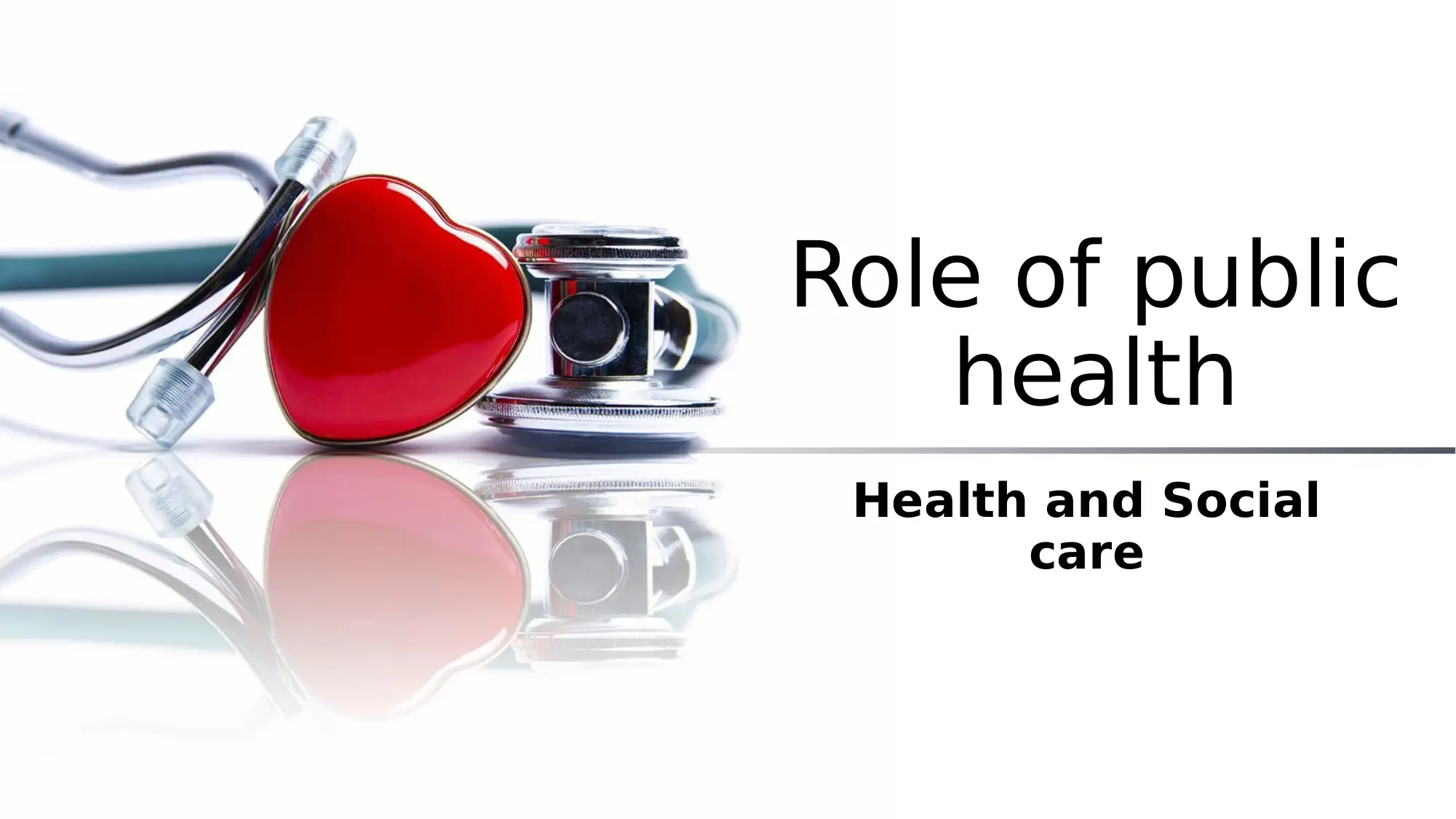
Role of public
health
Health and Social
care
health
Health and Social
care
Paraphrase This Document
Need a fresh take? Get an instant paraphrase of this document with our AI Paraphraser
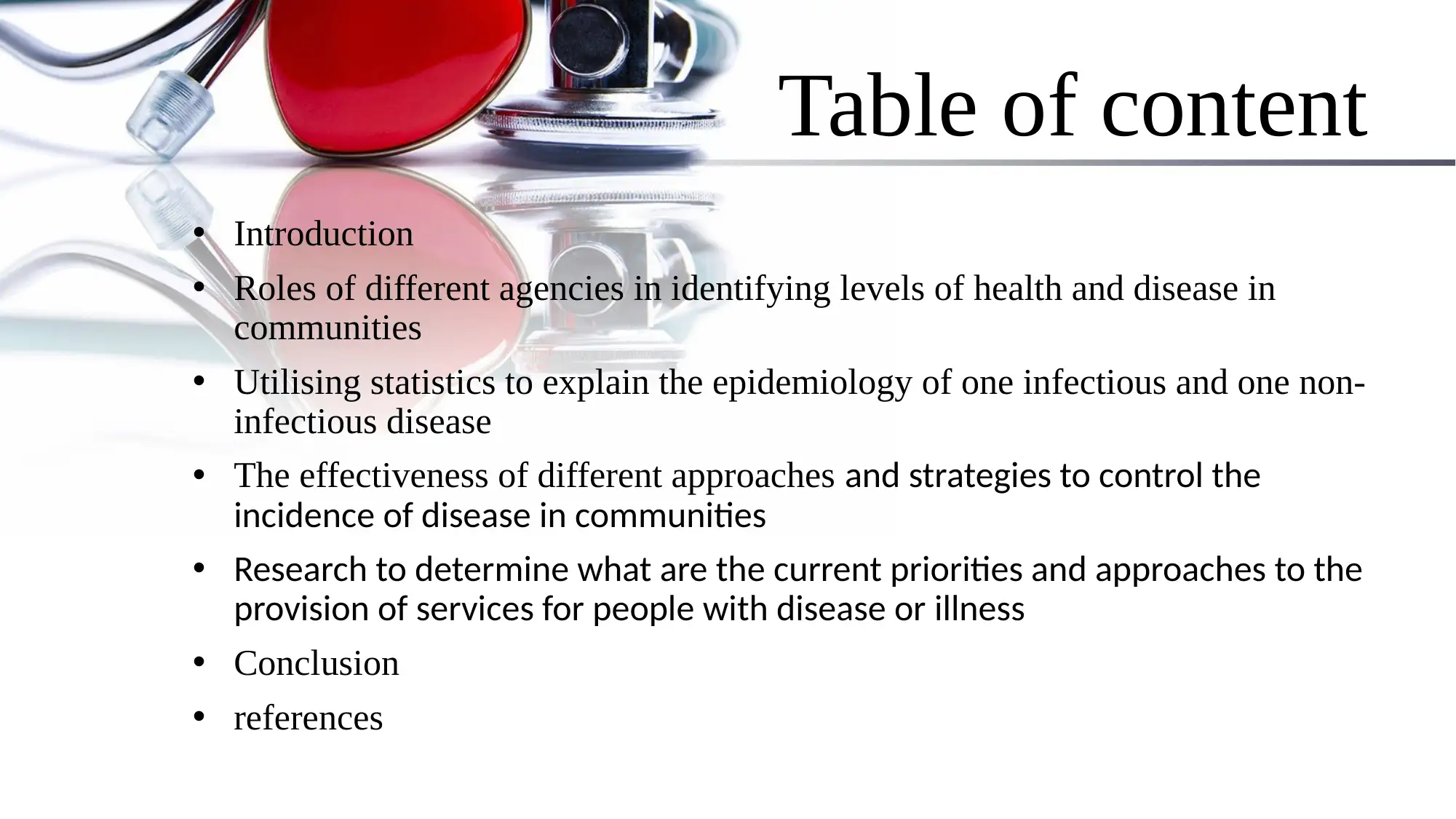
Table of content
• Introduction
• Roles of different agencies in identifying levels of health and disease in
communities
• Utilising statistics to explain the epidemiology of one infectious and one non-
infectious disease
• The effectiveness of different approaches and strategies to control the
incidence of disease in communities
• Research to determine what are the current priorities and approaches to the
provision of services for people with disease or illness
• Conclusion
• references
• Introduction
• Roles of different agencies in identifying levels of health and disease in
communities
• Utilising statistics to explain the epidemiology of one infectious and one non-
infectious disease
• The effectiveness of different approaches and strategies to control the
incidence of disease in communities
• Research to determine what are the current priorities and approaches to the
provision of services for people with disease or illness
• Conclusion
• references
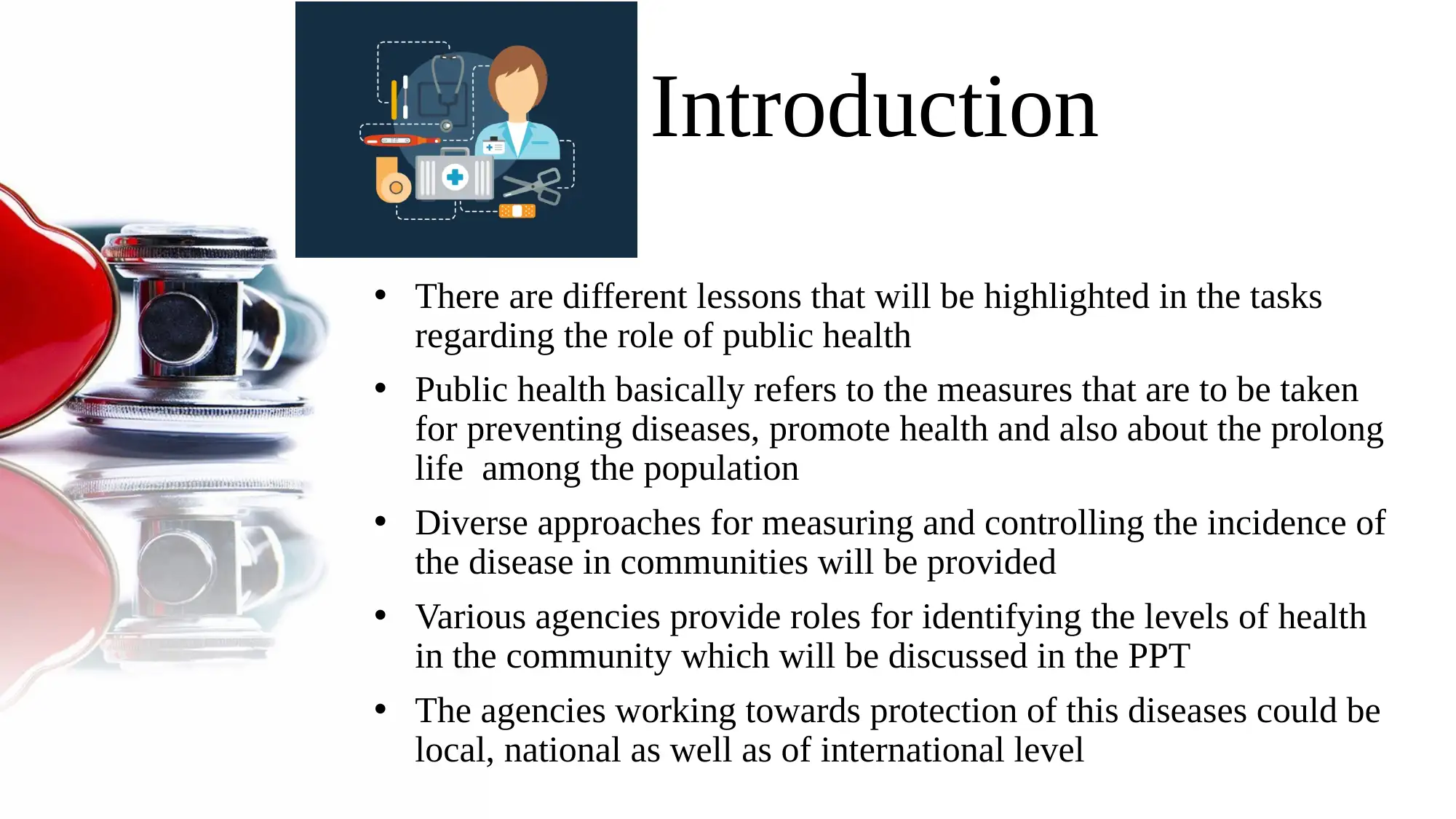
Introduction
• There are different lessons that will be highlighted in the tasks
regarding the role of public health
• Public health basically refers to the measures that are to be taken
for preventing diseases, promote health and also about the prolong
life among the population
• Diverse approaches for measuring and controlling the incidence of
the disease in communities will be provided
• Various agencies provide roles for identifying the levels of health
in the community which will be discussed in the PPT
• The agencies working towards protection of this diseases could be
local, national as well as of international level
• There are different lessons that will be highlighted in the tasks
regarding the role of public health
• Public health basically refers to the measures that are to be taken
for preventing diseases, promote health and also about the prolong
life among the population
• Diverse approaches for measuring and controlling the incidence of
the disease in communities will be provided
• Various agencies provide roles for identifying the levels of health
in the community which will be discussed in the PPT
• The agencies working towards protection of this diseases could be
local, national as well as of international level
⊘ This is a preview!⊘
Do you want full access?
Subscribe today to unlock all pages.

Trusted by 1+ million students worldwide
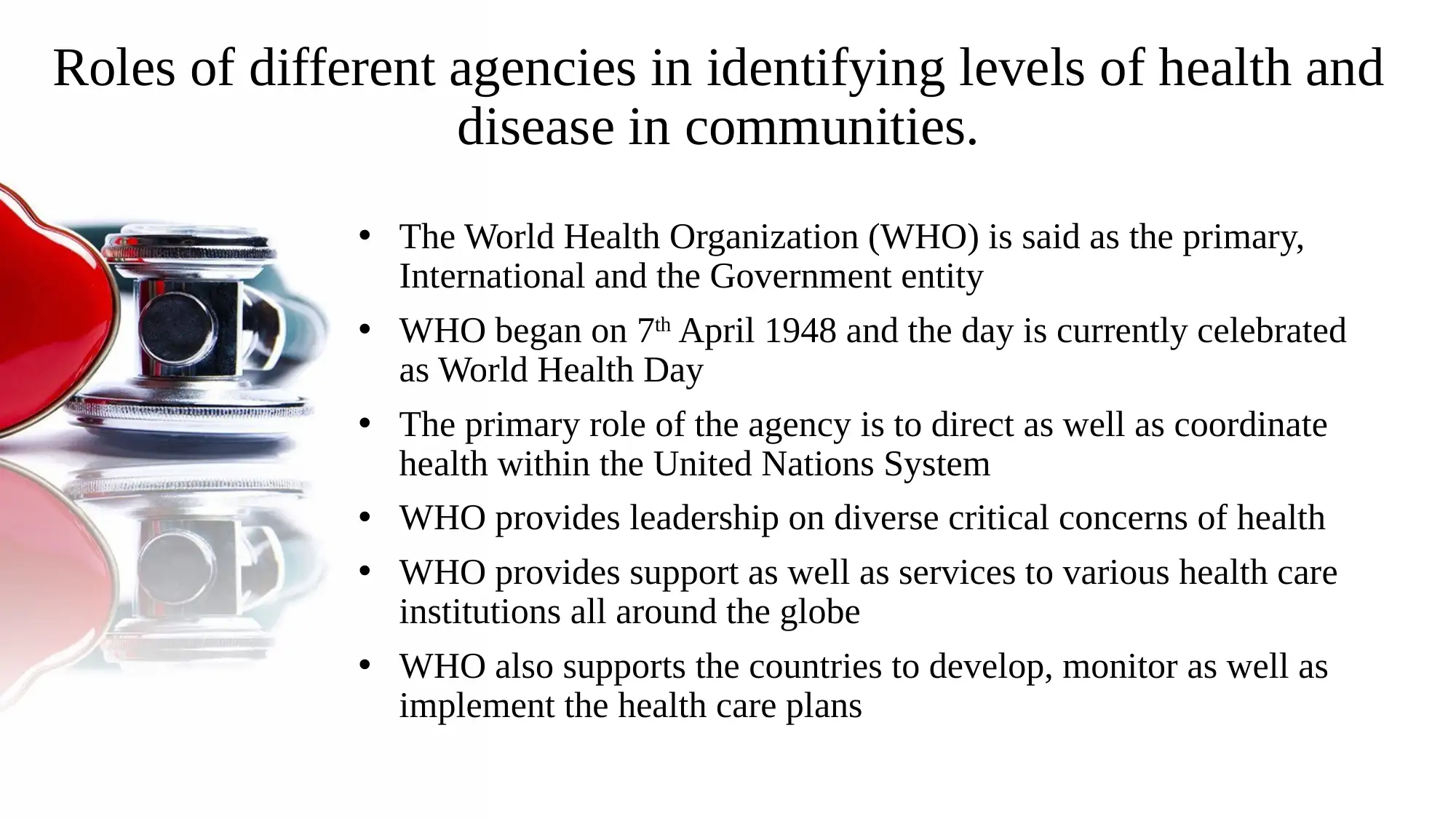
Roles of different agencies in identifying levels of health and
disease in communities.
• The World Health Organization (WHO) is said as the primary,
International and the Government entity
• WHO began on 7th April 1948 and the day is currently celebrated
as World Health Day
• The primary role of the agency is to direct as well as coordinate
health within the United Nations System
• WHO provides leadership on diverse critical concerns of health
• WHO provides support as well as services to various health care
institutions all around the globe
• WHO also supports the countries to develop, monitor as well as
implement the health care plans
disease in communities.
• The World Health Organization (WHO) is said as the primary,
International and the Government entity
• WHO began on 7th April 1948 and the day is currently celebrated
as World Health Day
• The primary role of the agency is to direct as well as coordinate
health within the United Nations System
• WHO provides leadership on diverse critical concerns of health
• WHO provides support as well as services to various health care
institutions all around the globe
• WHO also supports the countries to develop, monitor as well as
implement the health care plans
Paraphrase This Document
Need a fresh take? Get an instant paraphrase of this document with our AI Paraphraser
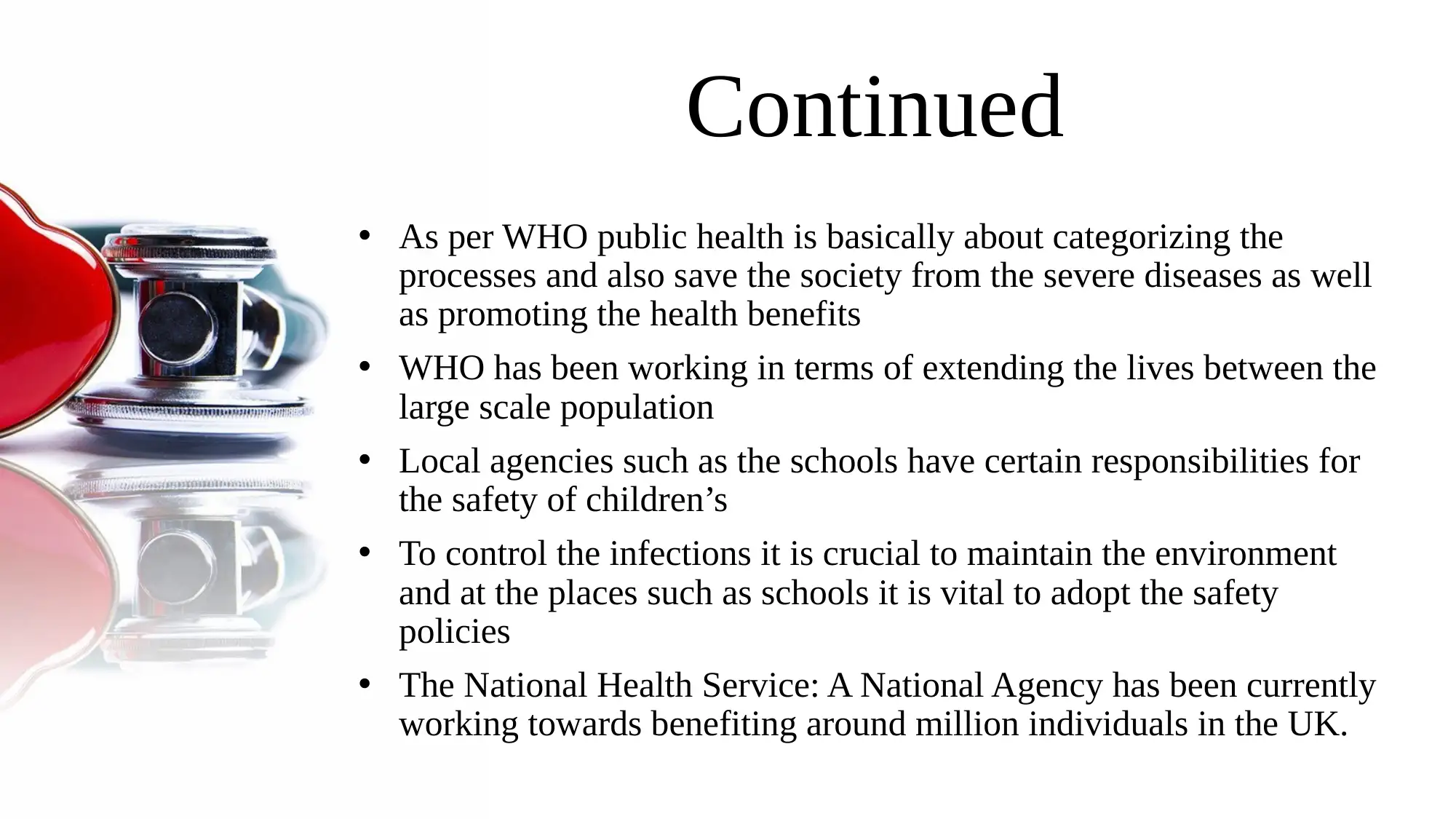
Continued
• As per WHO public health is basically about categorizing the
processes and also save the society from the severe diseases as well
as promoting the health benefits
• WHO has been working in terms of extending the lives between the
large scale population
• Local agencies such as the schools have certain responsibilities for
the safety of children’s
• To control the infections it is crucial to maintain the environment
and at the places such as schools it is vital to adopt the safety
policies
• The National Health Service: A National Agency has been currently
working towards benefiting around million individuals in the UK.
• As per WHO public health is basically about categorizing the
processes and also save the society from the severe diseases as well
as promoting the health benefits
• WHO has been working in terms of extending the lives between the
large scale population
• Local agencies such as the schools have certain responsibilities for
the safety of children’s
• To control the infections it is crucial to maintain the environment
and at the places such as schools it is vital to adopt the safety
policies
• The National Health Service: A National Agency has been currently
working towards benefiting around million individuals in the UK.
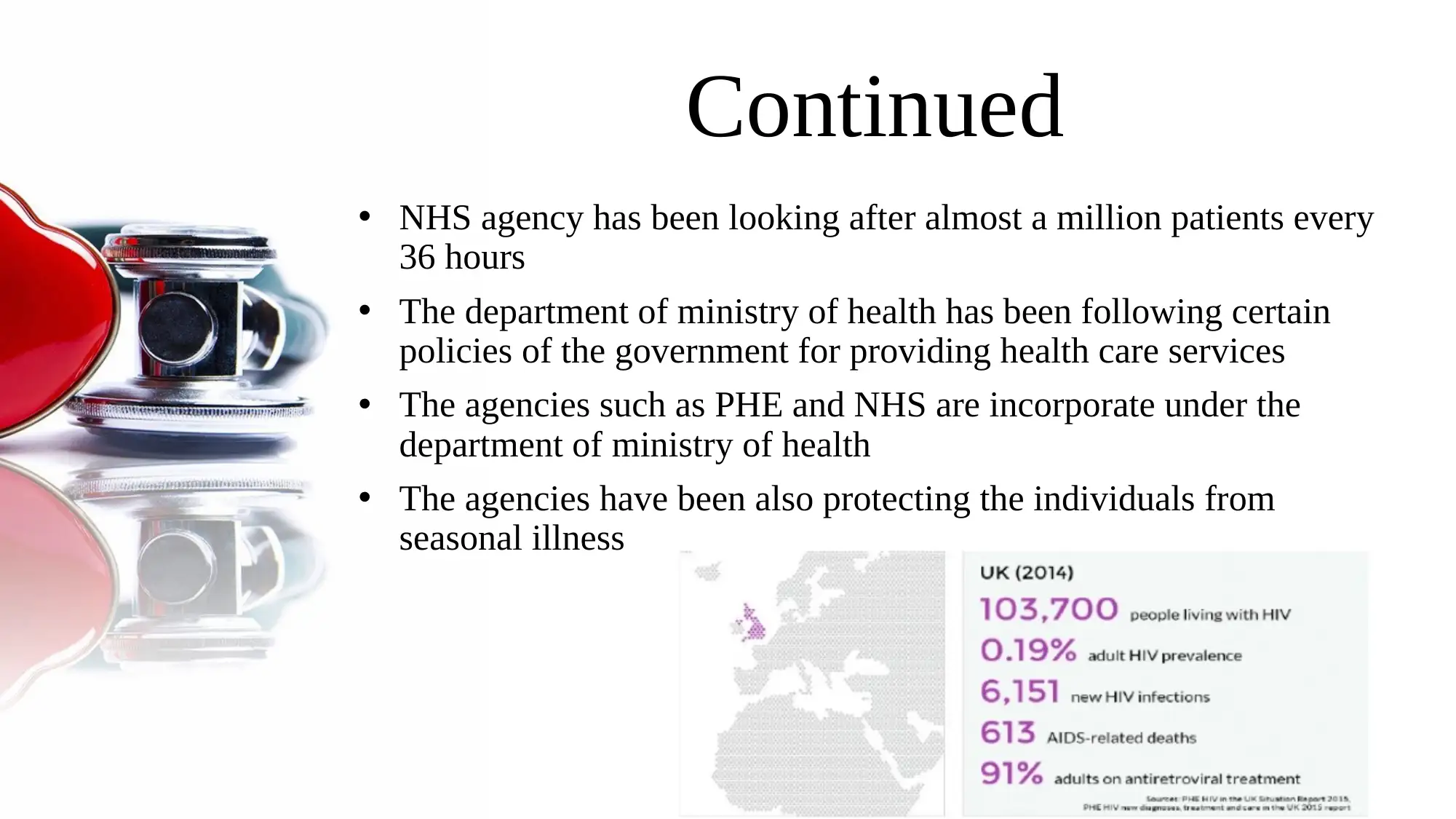
Continued
• NHS agency has been looking after almost a million patients every
36 hours
• The department of ministry of health has been following certain
policies of the government for providing health care services
• The agencies such as PHE and NHS are incorporate under the
department of ministry of health
• The agencies have been also protecting the individuals from
seasonal illness
• NHS agency has been looking after almost a million patients every
36 hours
• The department of ministry of health has been following certain
policies of the government for providing health care services
• The agencies such as PHE and NHS are incorporate under the
department of ministry of health
• The agencies have been also protecting the individuals from
seasonal illness
⊘ This is a preview!⊘
Do you want full access?
Subscribe today to unlock all pages.

Trusted by 1+ million students worldwide
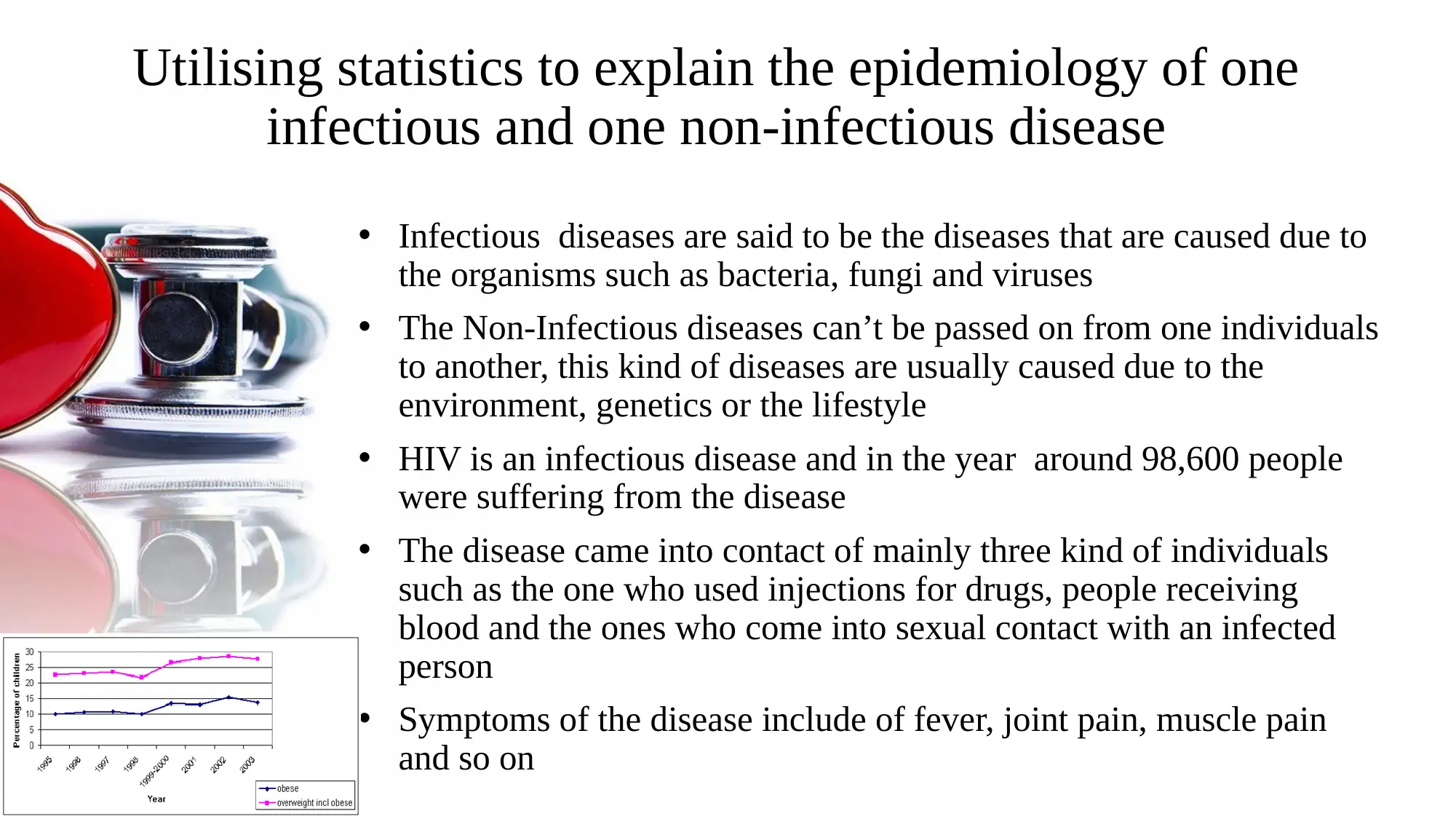
Utilising statistics to explain the epidemiology of one
infectious and one non-infectious disease
• Infectious diseases are said to be the diseases that are caused due to
the organisms such as bacteria, fungi and viruses
• The Non-Infectious diseases can’t be passed on from one individuals
to another, this kind of diseases are usually caused due to the
environment, genetics or the lifestyle
• HIV is an infectious disease and in the year around 98,600 people
were suffering from the disease
• The disease came into contact of mainly three kind of individuals
such as the one who used injections for drugs, people receiving
blood and the ones who come into sexual contact with an infected
person
• Symptoms of the disease include of fever, joint pain, muscle pain
and so on
infectious and one non-infectious disease
• Infectious diseases are said to be the diseases that are caused due to
the organisms such as bacteria, fungi and viruses
• The Non-Infectious diseases can’t be passed on from one individuals
to another, this kind of diseases are usually caused due to the
environment, genetics or the lifestyle
• HIV is an infectious disease and in the year around 98,600 people
were suffering from the disease
• The disease came into contact of mainly three kind of individuals
such as the one who used injections for drugs, people receiving
blood and the ones who come into sexual contact with an infected
person
• Symptoms of the disease include of fever, joint pain, muscle pain
and so on
Paraphrase This Document
Need a fresh take? Get an instant paraphrase of this document with our AI Paraphraser
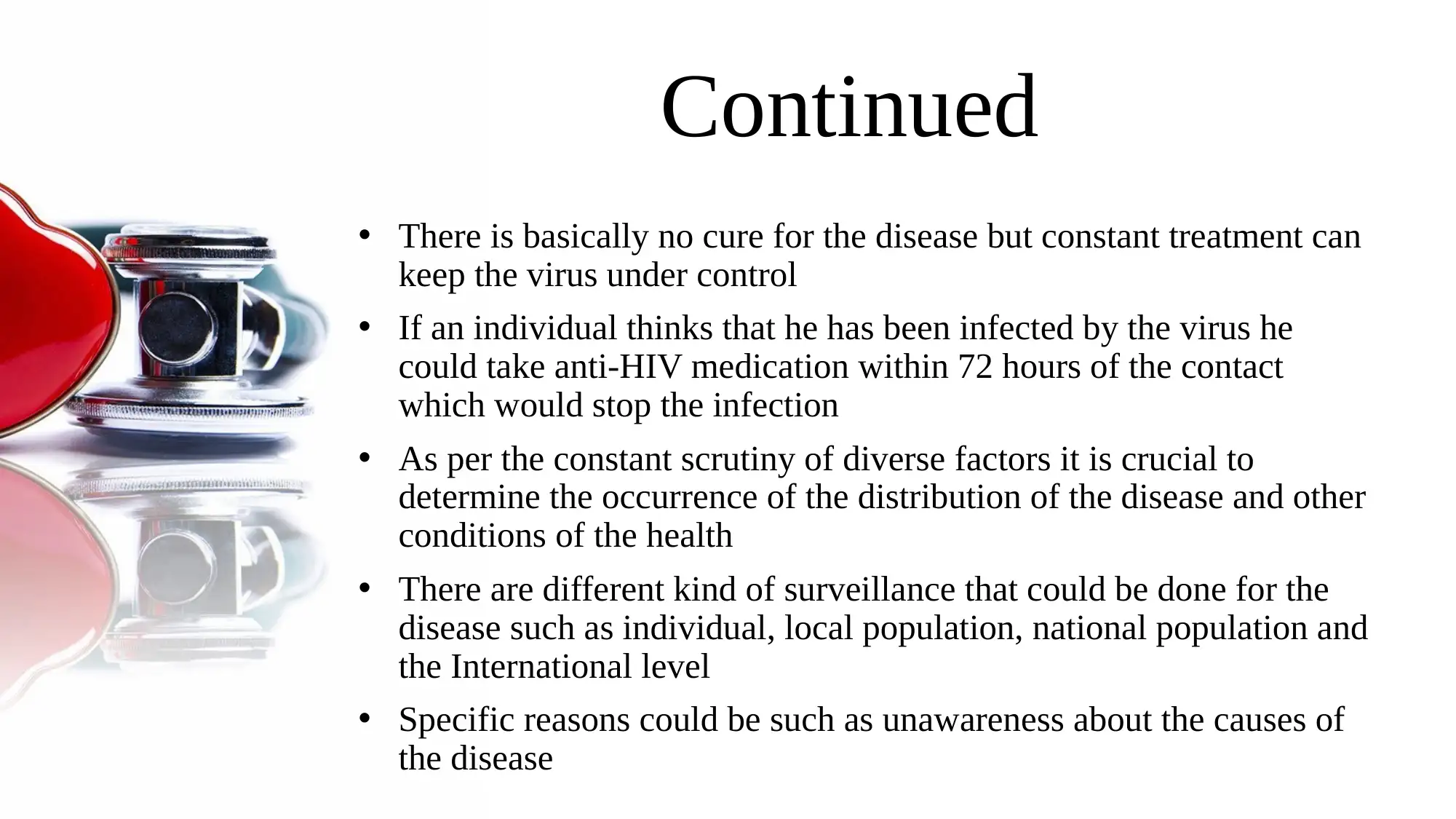
Continued
• There is basically no cure for the disease but constant treatment can
keep the virus under control
• If an individual thinks that he has been infected by the virus he
could take anti-HIV medication within 72 hours of the contact
which would stop the infection
• As per the constant scrutiny of diverse factors it is crucial to
determine the occurrence of the distribution of the disease and other
conditions of the health
• There are different kind of surveillance that could be done for the
disease such as individual, local population, national population and
the International level
• Specific reasons could be such as unawareness about the causes of
the disease
• There is basically no cure for the disease but constant treatment can
keep the virus under control
• If an individual thinks that he has been infected by the virus he
could take anti-HIV medication within 72 hours of the contact
which would stop the infection
• As per the constant scrutiny of diverse factors it is crucial to
determine the occurrence of the distribution of the disease and other
conditions of the health
• There are different kind of surveillance that could be done for the
disease such as individual, local population, national population and
the International level
• Specific reasons could be such as unawareness about the causes of
the disease
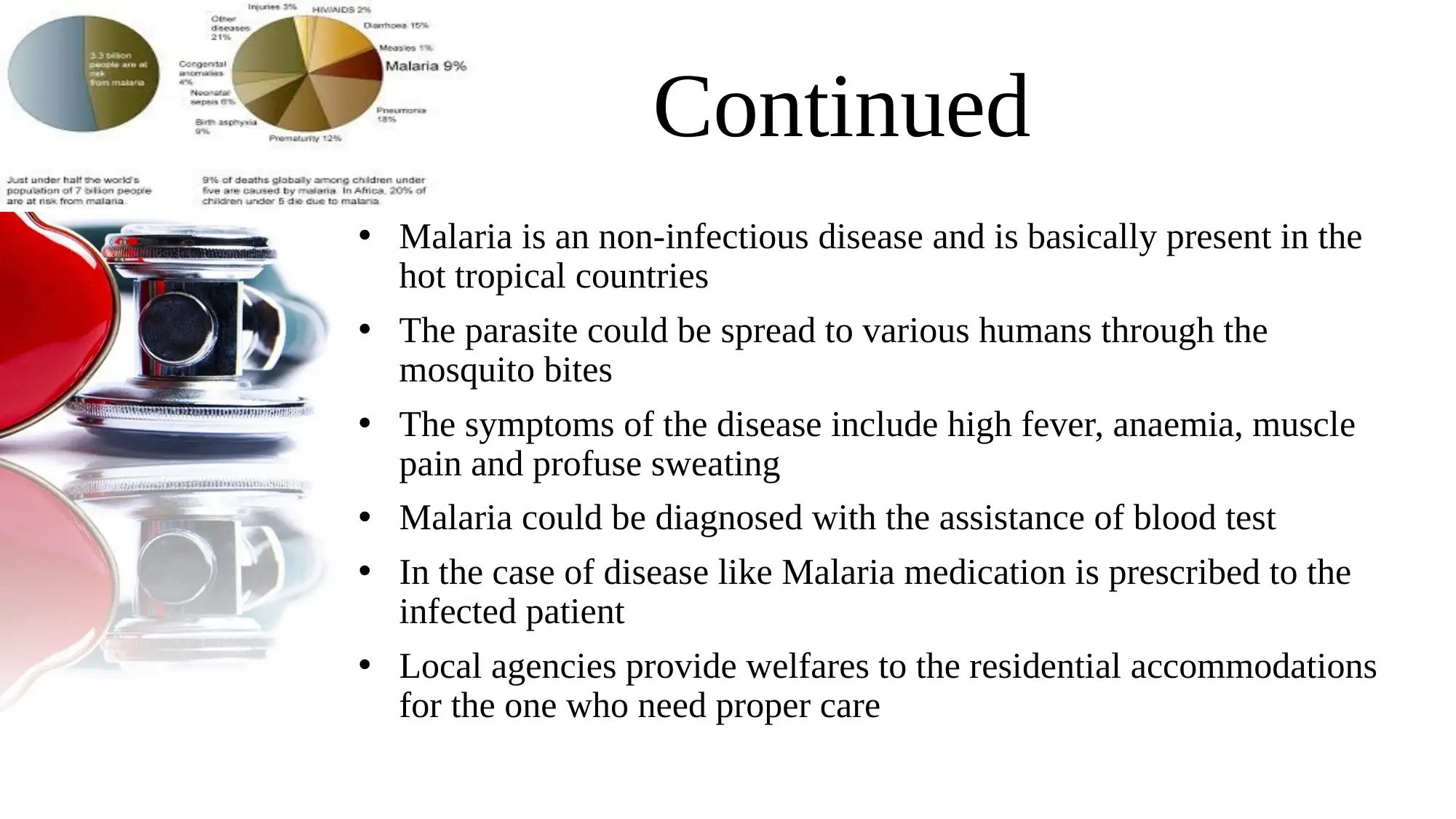
Continued
• Malaria is an non-infectious disease and is basically present in the
hot tropical countries
• The parasite could be spread to various humans through the
mosquito bites
• The symptoms of the disease include high fever, anaemia, muscle
pain and profuse sweating
• Malaria could be diagnosed with the assistance of blood test
• In the case of disease like Malaria medication is prescribed to the
infected patient
• Local agencies provide welfares to the residential accommodations
for the one who need proper care
• Malaria is an non-infectious disease and is basically present in the
hot tropical countries
• The parasite could be spread to various humans through the
mosquito bites
• The symptoms of the disease include high fever, anaemia, muscle
pain and profuse sweating
• Malaria could be diagnosed with the assistance of blood test
• In the case of disease like Malaria medication is prescribed to the
infected patient
• Local agencies provide welfares to the residential accommodations
for the one who need proper care
⊘ This is a preview!⊘
Do you want full access?
Subscribe today to unlock all pages.

Trusted by 1+ million students worldwide
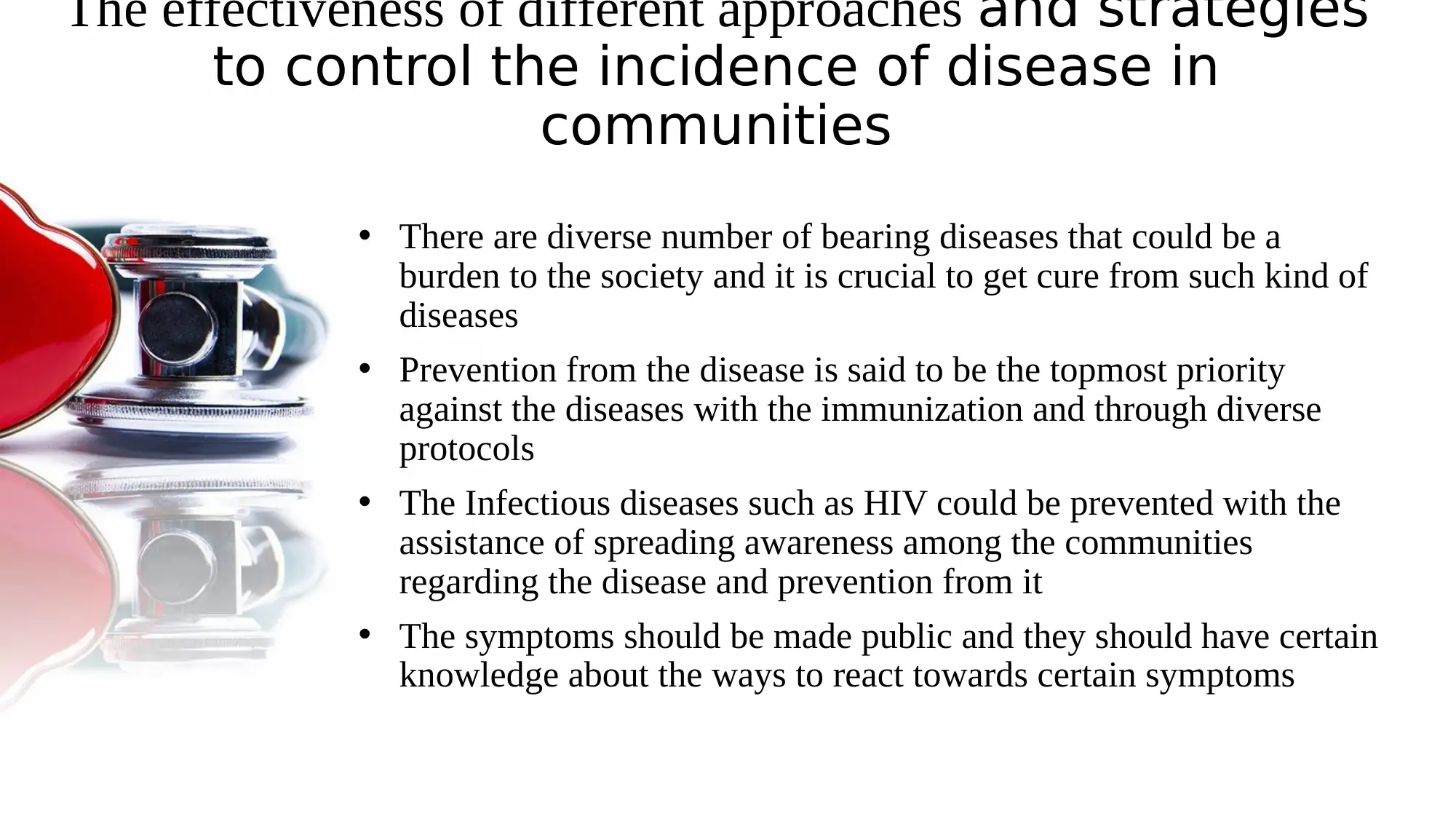
The effectiveness of different approaches and strategies
to control the incidence of disease in
communities
• There are diverse number of bearing diseases that could be a
burden to the society and it is crucial to get cure from such kind of
diseases
• Prevention from the disease is said to be the topmost priority
against the diseases with the immunization and through diverse
protocols
• The Infectious diseases such as HIV could be prevented with the
assistance of spreading awareness among the communities
regarding the disease and prevention from it
• The symptoms should be made public and they should have certain
knowledge about the ways to react towards certain symptoms
to control the incidence of disease in
communities
• There are diverse number of bearing diseases that could be a
burden to the society and it is crucial to get cure from such kind of
diseases
• Prevention from the disease is said to be the topmost priority
against the diseases with the immunization and through diverse
protocols
• The Infectious diseases such as HIV could be prevented with the
assistance of spreading awareness among the communities
regarding the disease and prevention from it
• The symptoms should be made public and they should have certain
knowledge about the ways to react towards certain symptoms
Paraphrase This Document
Need a fresh take? Get an instant paraphrase of this document with our AI Paraphraser
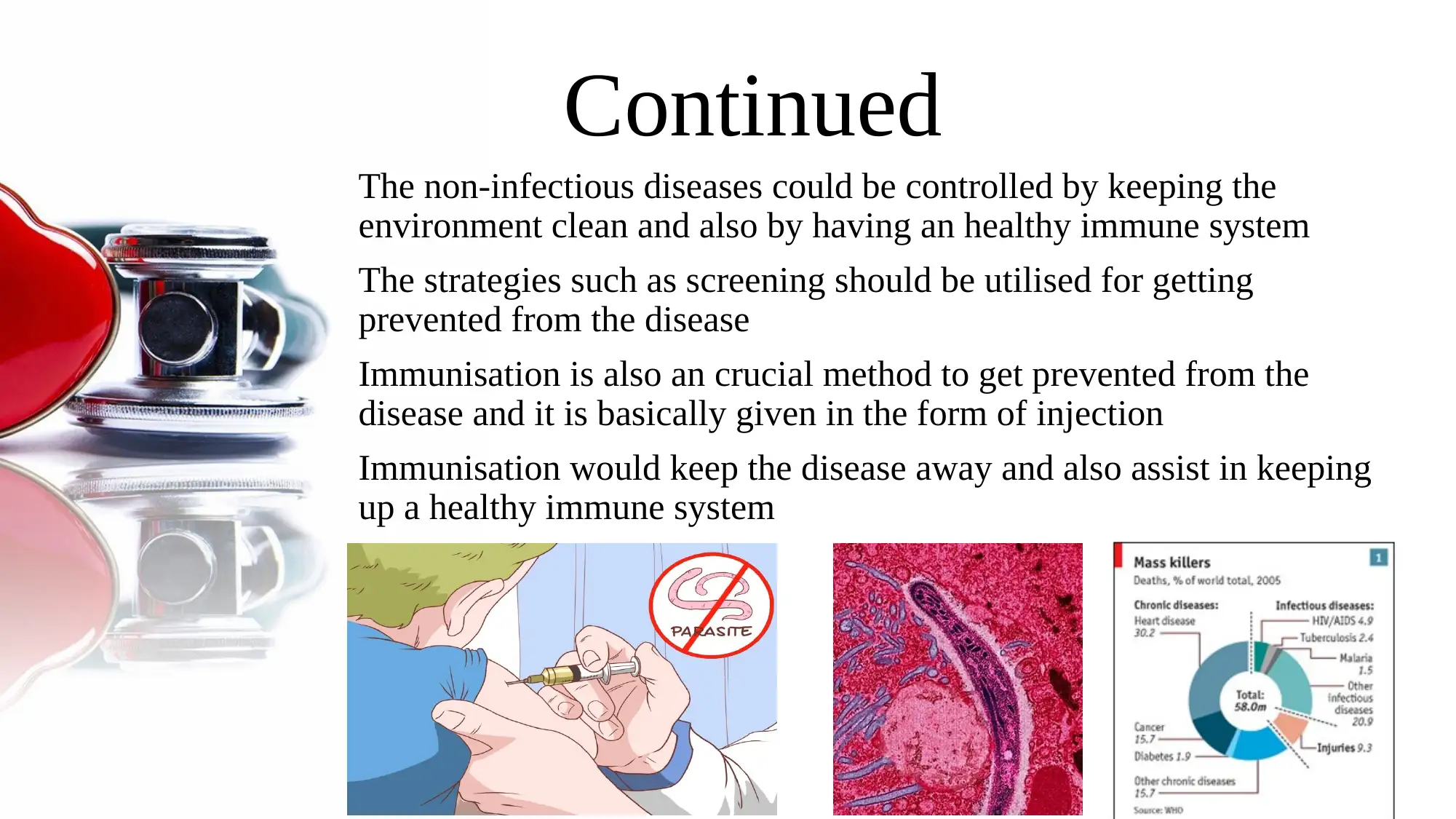
Continued
The non-infectious diseases could be controlled by keeping the
environment clean and also by having an healthy immune system
The strategies such as screening should be utilised for getting
prevented from the disease
Immunisation is also an crucial method to get prevented from the
disease and it is basically given in the form of injection
Immunisation would keep the disease away and also assist in keeping
up a healthy immune system
The non-infectious diseases could be controlled by keeping the
environment clean and also by having an healthy immune system
The strategies such as screening should be utilised for getting
prevented from the disease
Immunisation is also an crucial method to get prevented from the
disease and it is basically given in the form of injection
Immunisation would keep the disease away and also assist in keeping
up a healthy immune system
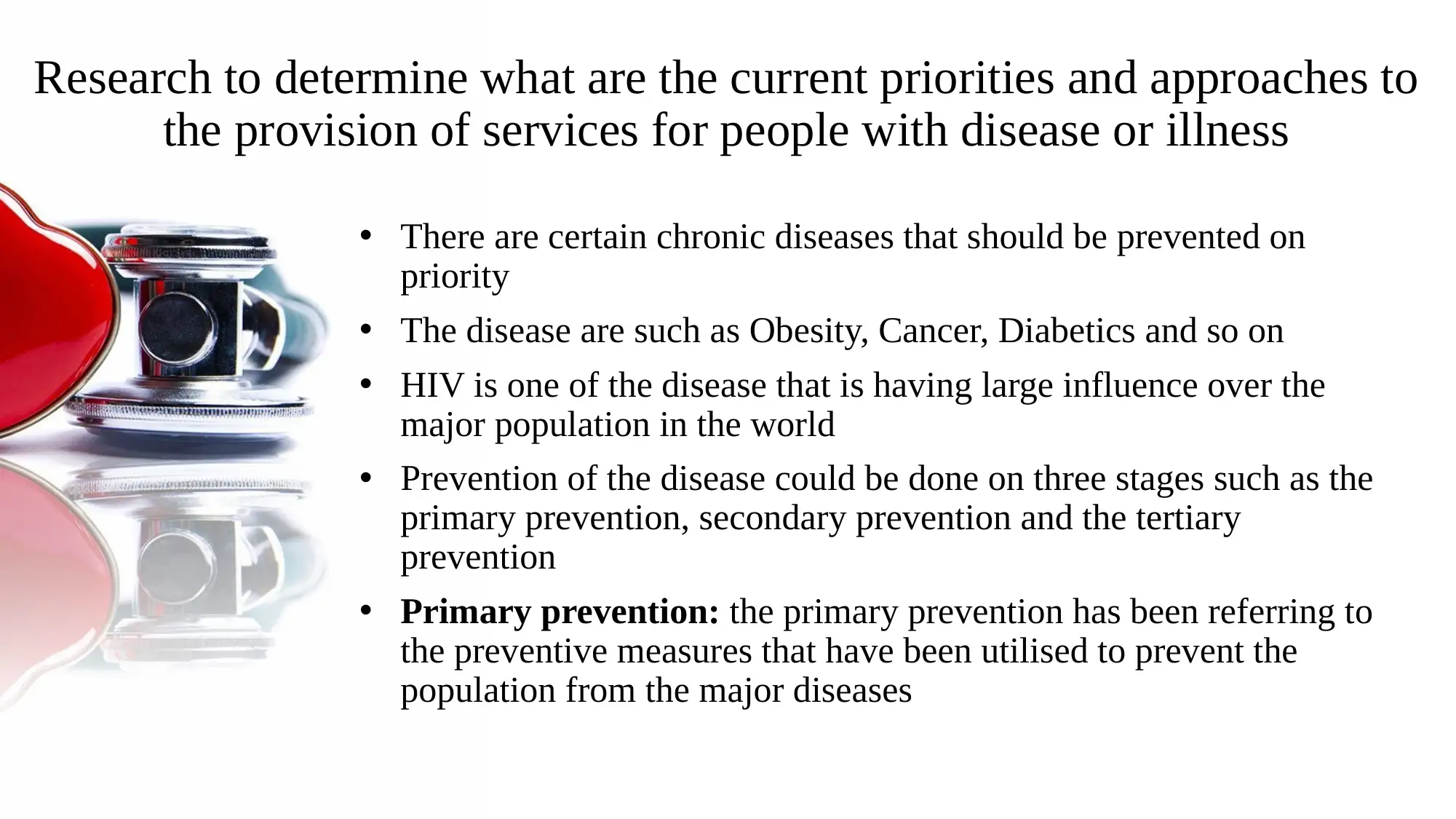
Research to determine what are the current priorities and approaches to
the provision of services for people with disease or illness
• There are certain chronic diseases that should be prevented on
priority
• The disease are such as Obesity, Cancer, Diabetics and so on
• HIV is one of the disease that is having large influence over the
major population in the world
• Prevention of the disease could be done on three stages such as the
primary prevention, secondary prevention and the tertiary
prevention
• Primary prevention: the primary prevention has been referring to
the preventive measures that have been utilised to prevent the
population from the major diseases
the provision of services for people with disease or illness
• There are certain chronic diseases that should be prevented on
priority
• The disease are such as Obesity, Cancer, Diabetics and so on
• HIV is one of the disease that is having large influence over the
major population in the world
• Prevention of the disease could be done on three stages such as the
primary prevention, secondary prevention and the tertiary
prevention
• Primary prevention: the primary prevention has been referring to
the preventive measures that have been utilised to prevent the
population from the major diseases
⊘ This is a preview!⊘
Do you want full access?
Subscribe today to unlock all pages.

Trusted by 1+ million students worldwide
1 out of 15
Related Documents
Your All-in-One AI-Powered Toolkit for Academic Success.
+13062052269
info@desklib.com
Available 24*7 on WhatsApp / Email
![[object Object]](/_next/static/media/star-bottom.7253800d.svg)
Unlock your academic potential
Copyright © 2020–2026 A2Z Services. All Rights Reserved. Developed and managed by ZUCOL.





